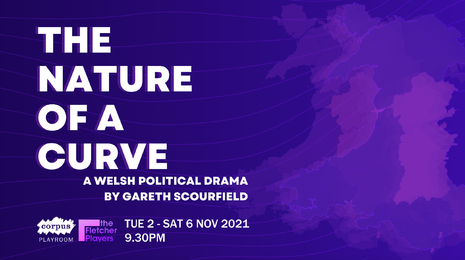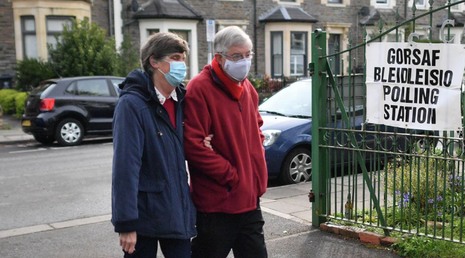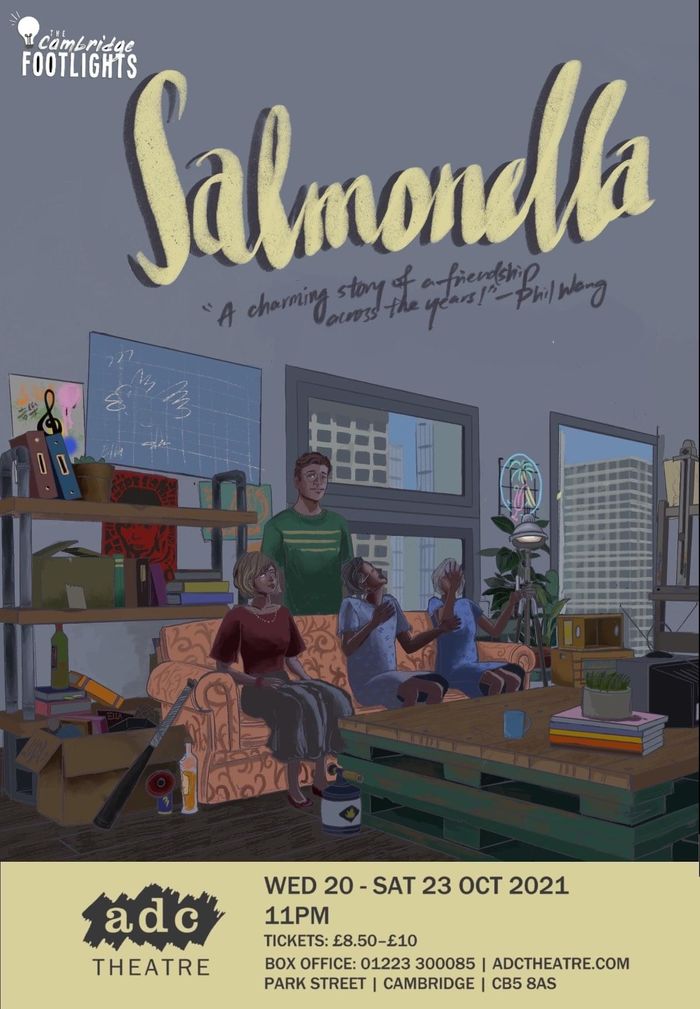The Nature of A Curve review – striking at the heart of Welsh politics
Emma Robinson reviews this week’s Corpus Lateshow, Gareth Scourfield’s The Nature of A Curve

We can only hope that Gareth Scourfield’s dissecting, critical look at rivalry and self-interest within politics is exaggerated. However, the rounded characterisation of Vicky Evans MS and John, played by Daisy Brown and James Critchley, makes the descent into what is eventually labelled as ‘corruption’ sadly traceable.
John is pragmatic, direct and well-connected. It’s because of these connections, which reveal to him the corruption across all levels of politics, or so he states, that he refuses to be held to a higher moral standard. Essentially, however, he’s a bully, and the only moments when he loses his composure, his self-control, is when he can’t control others.
When the election doesn’t seem to be going in their favour, James’ sudden and slightly hysterical reaction of brief, explosive shouting shows us, for the first time, John’s volatility. James brings the audience to a new level of intense silence.
"It’s merely a question of who can shout the loudest"
Unfortunately, the impact of such outbursts die away as the second half of the play seems to be shouting matches between different characters chasing each other in succession. While this shows the breakdown in order, and reduces politics, laughably, to a chaotic spectacle, it lacks the interesting subtext, evasion and introversion with which the play began. It seems that once everything is out in the open, and all secrets are known between Vicky’s advisory team, it’s merely a question of who can shout the loudest. It’s also slightly ironic that this is meant to be a depiction of the ‘underbelly’ of politics, and yet they’re all comfortable shouting in a public space – the leisure centre, where constituents had come to vote. The potential to create a tension between discretion and uncontainable emotion is overlooked.

Vicky, unlike John, is more sympathetically depicted. Daisy’s highly strung and spiralling portrayal leads us to believe that she only retains a focus because she has John’s instructive voice in her ear. Daisy’s heavy-footed striding and slumping into chairs or against walls definitely isn’t the performative composure you’d expect from a politician, but instead presumptuousness married with exhaustion.
Against this corrupt image of politics is the idealistic view of Carys, performed by Amy Mallows. A view which sincerely longs to place ‘the people’ first. Amy grounds the play with her understated anxiety, as her integrity is put under strain. She has a lightness and flitting quality which works against Daisy’s heaviness. Vitally, the appeals for connection and empathy within politics are framed by Carys’ moral conflict, and therefore prevents the play from being reduced to a single, explicit plea.
'Tim’s character is the aspect I found most uncomfortable watching"
The youngest member of Vicky’s advisory team is Tim, whom Macsen Llewelyn portrays with unceasing energy and optimism. His presence elevates the entire play which otherwise would have been incessantly intense, especially as the other characters' attempts at one-liner jokes fall flat with the student audience. However, while Tim’s character is perhaps one of the most vital aspects of the play tonally, it’s also the aspect I found most uncomfortable watching. Tim is characterised as neurodivergent; his unceasing energy is not merely a consequence of excitement, but an exaggeration of hyperactive tendencies which doesn’t seem to allow him the same variation of mood across the play which is attributed to the other characters.
Tim's optimism falls into an image of naivety and clumsiness, as he can’t even fulfil simple tasks. As seen in the quieter scene between Tim and Carys, Macsen can bring a beautiful sincerity and stillness to the role, but this was too rarely seen across the play. The extremely offensive descriptions of Tim by John, at worst as a ‘sentient dishcloth’, are clearly an attempt to further villainise the unempathetic, self-concerned John and condemn his conduct. However, the ability for the play to emphatically distance itself from John’s attitude is compromised by the fact Tim is often framed as a caricatured comic relief.
Gareth Scourfield's simple lighting design is brilliantly used to demarcate the movements in time and place. It is perfectly responsive to the actors' pacing and ensures a fluidity to the play’s movement, despite the multiple blackouts. The design aspects were particularly effective when creating the cold, distant environment of the BBC’s televised interviews of Vicky.
The interviews opened up the play from a sense of claustrophobic conflict to a wider social significance. It also enabled Gareth to offer another interrogative angle upon the political climate, as the BBC are frequently accused or joked about as being bias. This is the main way through which the specific context of the election is explored, as it shows Welsh nationalism and pro-British sentiments pitted against each other.
The play succeeds in bringing together enough elements of conflict, both between and within characters, to create a constantly evolving interest, without having to rely on the intensity provided by the time pressure of an election night. This may have felt odd as a Corpus Lateshow, which normally sees more comedic new writing, but it’s an insightful and exciting production.
 News / Pembroke to convert listed office building into accom9 December 2025
News / Pembroke to convert listed office building into accom9 December 2025 News / Gov declares £31m bus investment for Cambridge8 December 2025
News / Gov declares £31m bus investment for Cambridge8 December 2025 Features / Searching for community in queer Cambridge10 December 2025
Features / Searching for community in queer Cambridge10 December 2025 News / Uni redundancy consultation ‘falls short of legal duties’, unions say6 December 2025
News / Uni redundancy consultation ‘falls short of legal duties’, unions say6 December 2025 Lifestyle / Into the groove, out of the club9 December 2025
Lifestyle / Into the groove, out of the club9 December 2025









